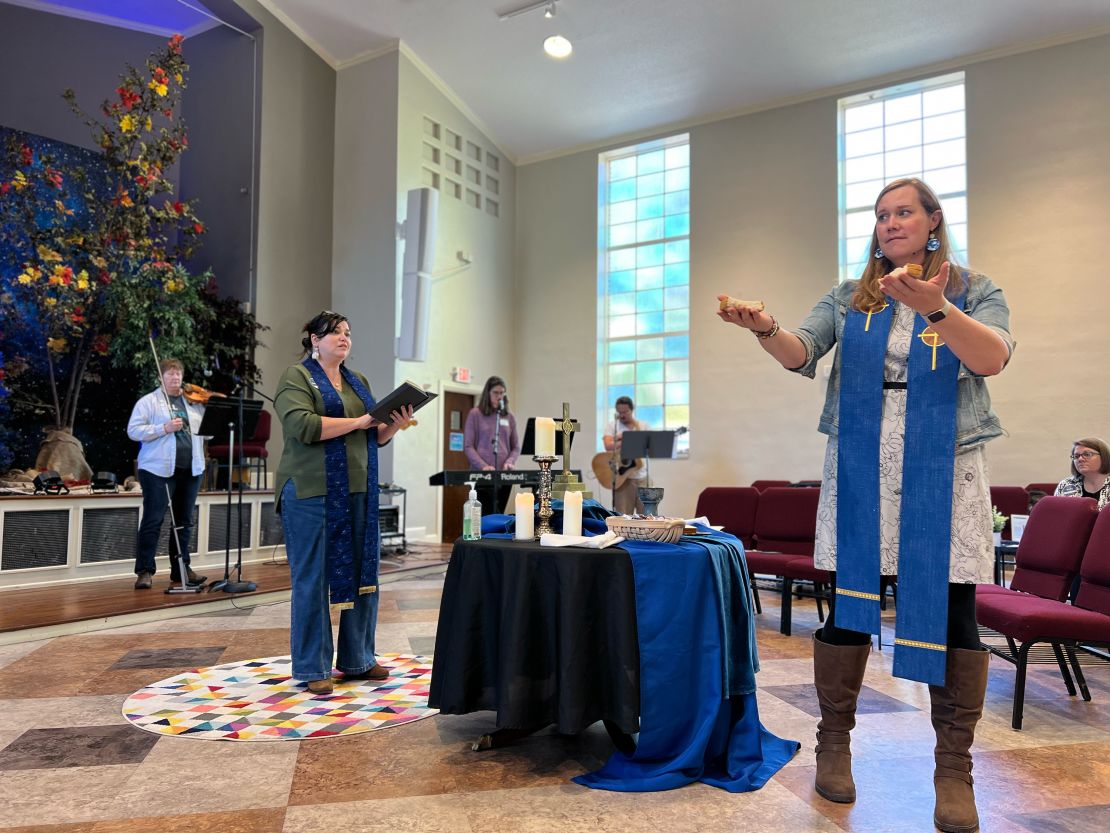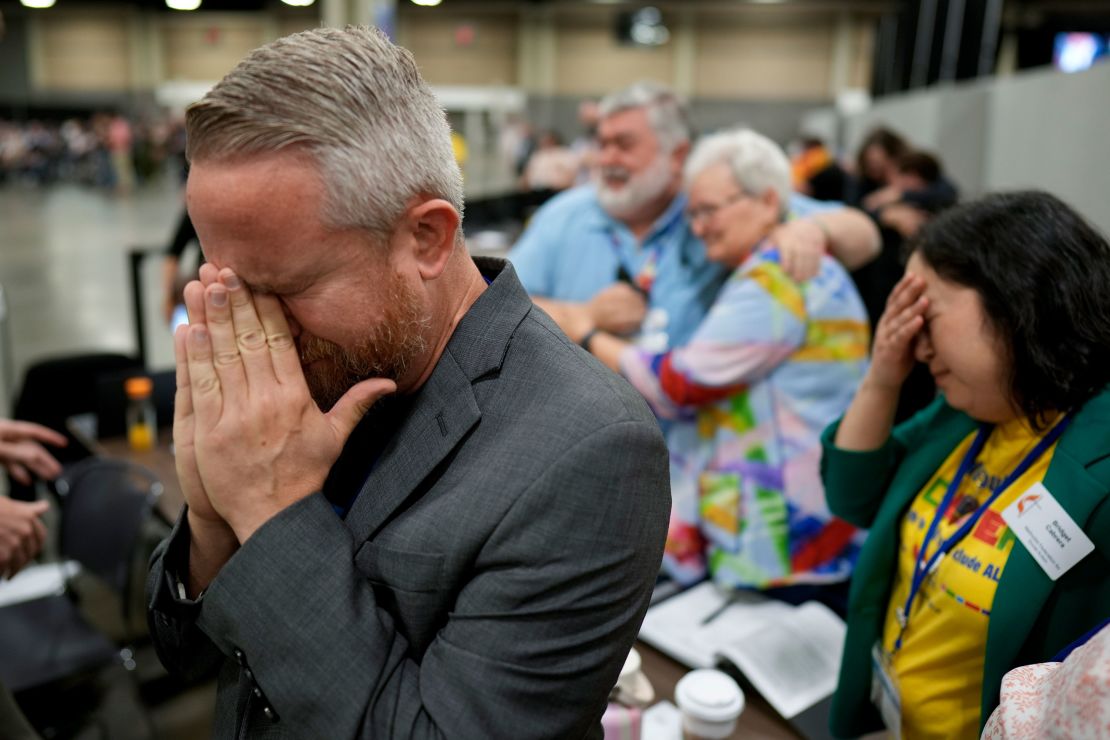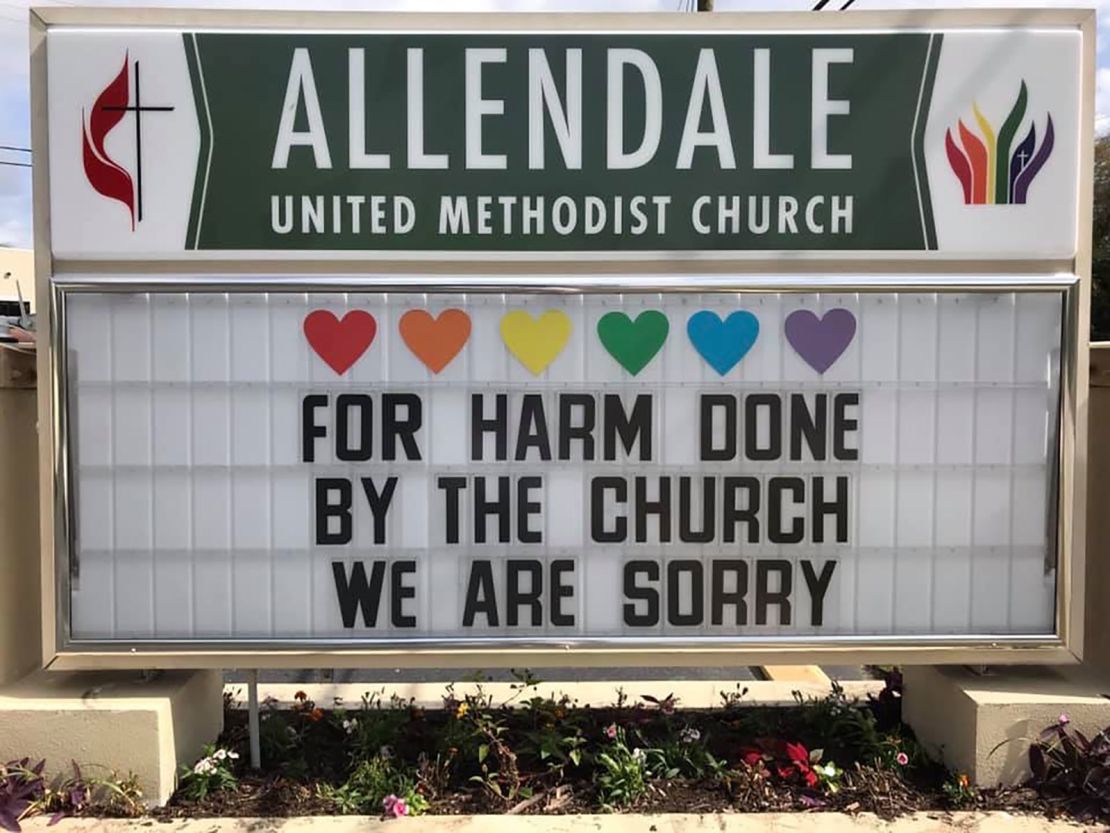On a Sunday morning in 2020, while Rev. Andi Woodworth welcomed her congregation to the Neighborhood Church in Atlanta, Georgia, she had an epiphany.
For years, Woodworth said she and her wife and co-pastor, Anjie, worked to build a United Methodist Church community that was “radically inclusive” of everyone – especially its LGBTQIA+ members.
Their church flouted the Methodist denomination’s official ideology, which, in 1972, declared homosexuality was “incompatible with Christian teaching” and later banned “self-avowed practicing homosexuals” from becoming ordained.
But that Sunday morning, as she welcomed everyone to church no matter their race, identity, or sexuality, Woodworth said she realized she was talking to herself.
“At the very beginning of 2020, I came out to myself as being trans,” she said. “I thought I was this White straight guy and, as it turns out, that’s not who I am at all. I spent a lot of the quarantine time at home figuring some things out about myself and realized that Anjie and I helped to start a church where I could actually be myself.”
While she was accepted by her own church community, Woodworth said the decision to embrace being a trans woman and a pastor in the United Methodist Church also meant that she could lose her job, her home and her congregation.
“I’m trans and that means if I’m going to be honest with myself and authentic in how I show up in the world, I’m going to have to wade into not just my own congregation, but into my denomination,” Woodworth said. “I was really not sure how that would go.”

A church at war with itself
The United Methodist Church has been at war with itself for decades over its stance on homosexuality.
Until recently, pastors were forbidden from performing same-sex marriages and those who did risked punishment, including being put on trial by the church, suspended or defrocked. One minister was even ousted for officiating his son’s wedding.
Others told CNN they felt they were blocked from becoming ordained after coming out. For decades, it is speculated that thousands of clergy and church members hid their sexuality, while a chasm grew between the conservative, the closeted and the challengers who protested the church’s anti-LGBTQ stance.
“There was always the threat for queer clergy that even with a supportive Bishop, even with the opportunity to serve in an out or semi-out way, that charges could be brought because the rules did exist,” Rev. Kristin Stoneking told CNN.
In 2019, the United Methodist Church’s governing body opened a temporary window for congregations to petition to leave over the issue. By 2023, according to church records, more than 7,600 churches voted to disaffiliate, with many conservative-leaning congregations splintering off.
But that longstanding schism ended this week when, in a historic move, the church passed a series of measures to remove anti-LGBTQ policies from its Book of Discipline, which sets out the denomination’s bylaws and regulations.
The church’s governing body marked a new era of LGBTQ inclusion by voting to lift the bans on LGBTQ clergy and on pastors performing same-sex unions. They also removed the language that said homosexuality was “incompatible with Christian teaching.”
Many, including Woodworth, felt the changes were monumental.
“This change in our church law is so huge because it means that folks can choose to show up as who they really are and still choose to serve God,” she said.
Anjie Woodworth, who attended the meeting known as the “General Conference,” said she watched as, with each vote, many of her colleagues and friends dissolved into tears.
“We’ve basically been through a denominational divorce already in a lot of ways,” she said. “There’s been so much harm done and so much abuse wrought on queer folks in our denomination – really overtly sometimes at past General Conferences – I think people’s fear and trauma responses have been coming up, even though things were going well.”
Anjie serves on the board of the Reconciling Ministries Network, an organization that’s worked for 40 years to ensure full inclusion of LGBTQ+ people in the United Methodist Church and clergy.
She said she celebrated the end of the church’s anti-LGBTQ policies with people who had been fighting for that inclusion for longer than she’s been alive.
“To get to watch these young folks celebrate with folks who have been at this work for decades … I was sobbing just at the beauty of it all,” she said.

Elation tempered by sadness
Rev. Andy Oliver, senior pastor at the Allendale United Methodist Church in St. Petersburg, Florida, said after such a historic week his thoughts are immediately drawn to the thousands of people who aren’t alive to witness the change, including his friend Robert “BJ” Jackson.
Oliver said his views on homosexuality changed when he met Jackson, his choir director in college. Jackson was gay and in a loving relationship, but he was forbidden from marrying his partner, Tim.
Over the years, Oliver said he and Jackson became best friends. He didn’t hesitate when they asked him to officiate their wedding, or dwell on the consequences performing the ceremony could have within the Methodist church.
BJ and Tim’s May 2014 wedding was the first same-sex union Oliver performed. He says he’s spent the last decade battling complaints and the threat of a church trial for officiating 26 others.
Robert “BJ” Jackson died in January 2023.
“He is really one of the reasons why I dedicated myself to this work … to create a church that would be fully inclusive and loving for him,” Oliver said.
He called Tim, Jackson’s widow, after the church’s historic week.
“I said, ‘You know, and I know, BJ was here,” Oliver said, growing emotional. “Can you imagine staying a part of a church all this time that in its rules tells you you’re incompatible? And yet you stay, and you fight because you know, a better church is possible.”

The Real Work Begins
The United Methodist Church, is one of the largest mainline Protestant Christian denominations in the United States, according to the Pew Research Center. As of 2022, the UMC says it has more than 5.4 million members in the US, across nearly 30,000 active churches.
The church has deep roots in Savannah, Georgia, where the founder of the Methodist movement – John Wesley – served as a minister when the city was the capital of the British colony, according to church history.
Rev. Billy Hester, said the church’s legacy and impact is visible throughout Savannah, which made it even more consequential when, in 2019, his congregation at Asbury Memorial Church voted to leave the denomination over its stance on homosexuality.
Hester said many of Asbury’s congregation identify as LGBTQ and after years of fighting against the UMC’s bylaws, the vote to disaffiliate was overwhelming.
Although his church is no longer a member of the UMC, Hester said he was encouraged by the news this week.
“I’m sorry that there’s been so much pain and suffering up until this point. I’m so glad this happened for the denomination,” he said.
But he also cautioned against sweeping pronouncements of change.
“Just because the denomination says it’s okay, doesn’t mean the local churches will. What I hope will happen now in these Methodist congregations is for LGBTQ folks to feel very affirmed.”
CNN’s Justin Gamble contributed to this report.
